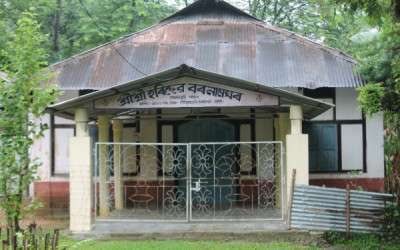Life & Legacy
Ancestry and Birth
Sri Haridev was born on the fifth day of the bright fortnight (Shukla Panchami) of the Bhadra month in 1426 CE in Narayanpur, Lakhimpur district, Assam. His father was Dwij Ajanabha, and his mother was Parijat Devi. Although his ancestors came from Kanyakubja (present-day Kannauj in Uttar Pradesh), they eventually settled in Assam.
Childhood and Education
Born into a Brahmin (Goswami) family, Haridev underwent the sacred thread ceremony at the age of nine and received primary education under Govinda Pandit. His father taught him Sanskrit grammar during his childhood. He gained knowledge of Panini’s grammar, the Vedas, and philosophy at an early age. From his youth, Haridev exhibited extraordinary scholarly abilities in various subjects.
Career and Spiritual Journey
Rejecting violence and sacrificial rituals, Haridev dedicated himself to Vedic Vaishnavite philosophy. In 1443 CE, he faced royal persecution. However, by evading the king's messengers, Huma and Bhima, he escaped via the Brahmaputra River and took refuge in Ashvaklanta, located in North Guwahati. There, he received initiation from a monk named Madhav.
Afterward, he traveled to Hajo and visited the Hayagriva Madhava Temple and Kedar Temple. Continuing his spiritual journey, he sailed to Shrikshetra (Puri, Odisha) and visited the Jagannath Temple, staying at the house of a priest named Vishambhar. He visited all major pilgrimage sites in North India and finally stayed in Kashi (Varanasi) for four years, studying the Vedas and philosophy under Shraddhananda Acharya.
With his mastery of the Vedas and philosophy, he earned the title "Darshan Vedacharya", and later, after five years of deep study of the Bhagavata Purana in Jagannath, he received the title "Bhagavat Acharya."
After completing his pilgrimage, he returned to Bahari, his ancestral land. There, by the strength of his character and intellect, he was able to reform many immoral individuals. In 1453, he established an ashram named "Sat Sangi Haridev Ashram", which was later renamed "Gurudev Sevashram."
Acknowledging his spiritual stature, Srimanta Sankardev and Sri Damodardev honored him. This honorific recognition led to the Gurudev Sevashram being widely known as the Maneri Satra, also referred to as Bahari Satra.
Personal Life
While residing in Bahari, Haridev married Tilottama, daughter of Krishnakanta Adhyapak. They had one daughter named Bhubaneshwari, who remained unmarried and dedicated herself to spiritual knowledge. She later became the Satradhikarini (female head) of the Maneri Satra, the only woman in Assam to have achieved such a distinguished position in the propagation of Vaishnavism.
Recognizing Haridev’s spiritual and intellectual brilliance, the King of Cooch Behar, Malladev, honored him and took initiation along with his wife. The king also established the Haripur Satra, about 3-4 kilometers away from Cooch Behar, to facilitate the spread of Vaishnavism.
After spending some time at Haripur, Haridev returned to Bahari (present-day Barpeta district) and continued his religious teachings from the Maneri Satra.
Propagation of Vaishnavism
Haridev believed in a monotheistic religion based on the Vedas, the Gita, and the Bhagavata Purana, where Lord Krishna is the ultimate deity. He rejected sacrificial rituals but did not condemn the worship of other deities. According to him, just as all rivers flow into the ocean, all forms of worship ultimately lead to Keshava (Lord Krishna).
He believed that the nine forms of devotion (Navavidha Bhakti) described in the Bhagavata Purana could lead to liberation, but only under the guidance of a true Guru.
Versatile Genius
Haridev was a simple, spiritual, and deeply learned scholar with vast knowledge of the Vedas, Upanishads, the Gita, and the Bhagavata. He not only preached the core essence of these scriptures to his followers but also documented them.
Literary Contributions
One of the hallmarks of Haridev’s prose was his ability to express complex ideas using short and simple sentences. His work "Bhaktiras Tarangini" is considered a significant piece of early Assamese prose literature.
Notable Works
The following manuscripts are attributed to him:
-
Sharana Sanghita
-
Bhaktiras Tarangini
He also composed devotional songs. Sharana Sanghita discusses the necessity, meaning, and methods of spiritual surrender, while Bhaktiras Tarangini provides a philosophical analysis of the essence of the Bhagavata. One side of the text contains Sanskrit verses, and the opposite side contains their Assamese prose translations.
He also wrote a one-act play titled "Ramabhishek", narrating the story of Rama’s birth, marriage, exile, and coronation. In another work, "Harinam Kirtan Paddhati", he explains the meaning and detailed framework of kirtan (devotional chanting).
English Translations of His Works
-
Sharana Siddhanta (1991) – Published by North-East India Haridev Sangha
-
Bhaktiras Tarangini (1992) – Published by North-East India Haridev Sangha
Biographical Texts about Haridev
-
Gurucharitamrita (Sanskrit) by Dwij Baneshwar
-
Shri Shri Hariharadev Charitra – Assamese translation by Dwij Dibakar
-
Mahapurush Shri Shri Hariharadev Charit by Banagangagiri (also known as the "Fake Charit")
-
Modern Mahapurush Shri Shri Hariharadev Kirtan by Damodardev Goswami
Satras Established by Haridev
-
Bahari Satra
-
Maneri Satra
-
Haripur Satra
-
Kaihati Satra
Demise
Mahapurush Haridev continued his religious work until the end of his life. He passed away at Bahari on the new moon day (Amavasya) of the Jyeshtha month in 1566 CE (1488 Shaka Era).
Haridev Tithi
The detah anniversary of Haridev is celebrated in Namghars and Sattras of Assam as Tithi of Haridev. The Tirobhav Tithi (astrological date) of Haridev is celerated on May 26nd in every year in Assam. It is observed as a restricted holiday in Assam. The Government of Assam declares this day as holiday in every year on this occasion.
